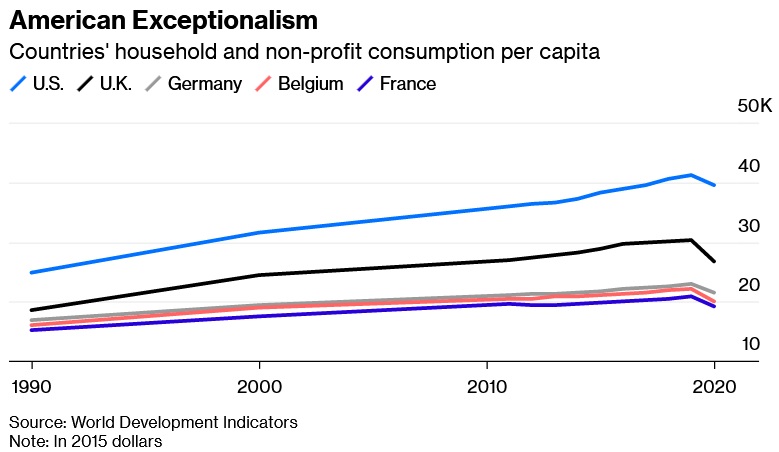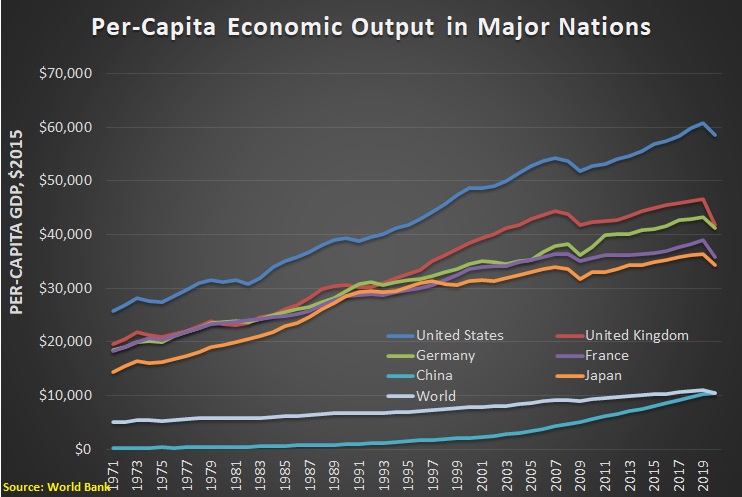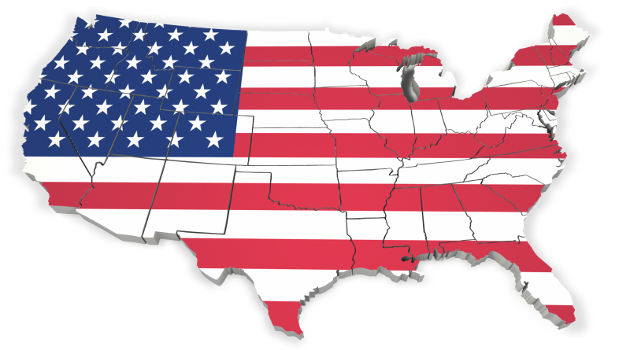As I warned a few days ago, Biden’s so-called Build Back Better plan is not dead.
There’s still a significant risk that this economy-sapping plan will get enacted, resulting in big tax increases and a larger burden of government spending.
Proponents of a bigger welfare state say the President’s plan should be approved so that the United States can be more like Europe.
This argument is baffling because it doesn’t make sense to copy countries where living standards are significantly lower.
In some cases dramatically lower.
Let’s explore this issue in greater detail.
In a column for Bloomberg, Allison Schrager analyzes America’s supply-chain problems and the impact on consumption patterns.
But what caught my eye were the numbers comparing the United States and Europe.
Americans can’t spend like they used to. Store shelves are emptying, and it can take months to find a car, refrigerator or sofa. If this continues, we may need to learn to do without — and, horrors, live more like the Europeans. That actually might not be a bad thing, because the U.S. economy could be healthier if it were less reliant on consumption. …We consume much more than we used to and more than other countries. Consumption per capita grew about 65% from 1990 to 2015, compared with about 35% growth in Europe. …What would that mean for the U.S. economy? European levels of consumption coexist with lower levels of growth.
Here’s the chart that accompanied her article.
As you can see, consumption in the United States is far higher than it is in major European nations – about $15,000-per-year higher than the United Kingdom and about double the levels in Germany, Belgium, and France.

So when someone says we should expand the welfare state and be more like Europe, what they’re really saying is that we should copy nations that are far behind the United States.
Some of you may have noticed that Ms. Schrager is citing per-capita consumption data from the World Bank and you may be wondering whether other numbers tell a different story.
After all, if higher levels of consumption in America are simply the result of borrowing from overseas, that would be a negative rather than a positive.
So I went to the same website and downloaded the data for per-capita gross domestic product instead. I then created this chart (going all the way back to 1971). As you can see, it shows that Americans not only consume more, but we also produce more.

For those interested, I also included Japan and China, as well as the average for the entire world.
The bottom line is that it’s good to be part of western civilization. But it’s especially good to be in the United States.
Since we’re on the topic of comparative economics, David Harsanyi of National Review recently wrote about the gap between the United States and Europe.
More than anything, it is the ingrained American entrepreneurial spirit and work ethic that separates us from Europe and the rest of the world. …Europe, despite its wealth, its relatively stable institutions, its giant marketplace, and its intellectual firepower, is home to only one of the top 30 global Internet companies in the world (Spotify), while the United States is home to 18 of the top 30. …One of the most underrated traits we hold, for instance, is our relative comfort with risk — a behavior embedded in the American character. …Americans, self-selected risk-takers, created an individual and communal independence that engendered creativity. …Because of a preoccupation with “inequality” — one shared by the modern American Left — European rules and taxation for stock-option remuneration make it difficult for start-up employees to enjoy the benefits of innovation — and make it harder for new companies to attract talent. …But the deeper problem is that European culture values stability over success, security over invention…in Europe, hard work is less likely to guarantee results because policies that allow people to keep the fruits of their labor and compete matter far less.
In other words, there’s less economic dynamism because the reward for being productive is lower in Europe (which is simply another way of saying taxes are higher in Europe).
P.S. The main forcus of Ms. Schrager’s Bloomberg article was whether the U.S. economy is too dependent on consumption.
It feels like our voracious consumption is what fuels the economy. But that needn’t be the case. Long-term, sustainable growth doesn’t come from going deep into debt to buy stuff we don’t really need. It comes from technology and innovation, where we come up with new products and better ways of doing things. An economy based on consumption is not sustainable.
I sort of agree with her point.
Simply stated high levels of consumption don’t cause a strong economy. It’s the other way around. A strong economy enables high levels of consumption.
But this doesn’t mean consumption is bad, or that it would be good for America to be more like Europe.
Instead, the real lesson is that you want the types of policies (free markets and limited government) that will produce innovation and investment.
That results in higher levels of income, which then allows higher levels of consumption.




